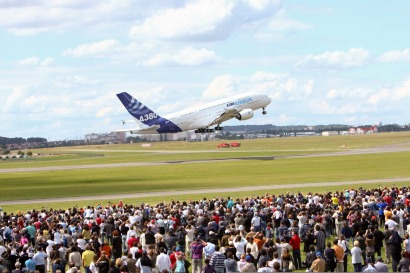
Every day this week, the Paris Air Show, being held in Paris until 26 June, has been the scene of new stories about aviation biofuels. It all began with the landings at Paris-Le Bourget Airport (the venue of the show) of the first aircraft to cross the Atlantic on a mixture of kerosene and camelina-based biodiesel. The first, completed using Honeywell’s Green Jet Fuel, carried a 50% blend in one engine, while the second featuring a Boeing 747-8, ran on a 15% blend in each of its four engines. At the same event, the European aerospace consortium, EADS, launched the Zero Emission Transportation Hypersonic, an aircraft of the future capable of linking Paris with Tokyo (5,000 miles) in two hours, and again using biofuels as one of its fuels.
Yesterday, saw the turn of the European Commission (EC), which together with Airbus, major airlines across Europe and several biofuel producers presented the European Advanced Biofuels Flightpath. The main objective of this agreement is to reach two million tonnes of biofuels in aviation in the European Union (EU) in 2020. The EC confirmed that to prepare this launch, the Flightpath “was discussed widely by representatives from EU Member States' energy, research and transportation departments, industry representatives from the aviation and biofuels sector and non-governmental organisations”.
The parties agreed to make “all best efforts” to support the activities described in the Flightpath, for reaching the objectives. It was agreed to enhance their co-operation in the areas mentioned in the Flightpath, each in the respective sphere of their competence and within the limits of their overall resources and possibilities, and applicable rules and regulations.
The parties emphasised the need to work together to promote production, distribution, storage and use of sustainably produced and technically certified biofuels. For this, they said, it is necessary to join forces in establishing appropriate and effective financial mechanisms to support the construction of industrial “first of a kind” advanced biofuel production plants.
More specifically, the action set out in the Flightpath focuses on the following issues:
1. Facilitate the development of standards for drop-in biofuels and their certification for use in commercial aircrafts;
2. Work together with the full supply chain to further develop worldwide accepted sustainability certification frameworks;
3. Agree on biofuel take-off arrangements over a defined period of time and at a reasonable cost;
4. Promote appropriate public and private actions to ensure the market uptake of paraffinic biofuels by the aviation sector;
5. Establish financing structures to facilitate the realization of 2G biofuel projects;
6. Accelerate targeted research and innovation for advanced biofuel technologies, and especially algae; and
7. Take concrete actions to inform the European citizen of the benefits of replacing kerosene by certified sustainable biofuels.
The working methods and governance will be the ones established in the Strategic Energy Technology Plan (SET-Plan) of the European Union, as presented by the Commission and endorsed by the European Parliament and the Heads of States and Governments on 4 February 2011. The table below gives and overview about objectives, tasks, and milestones of this venture:

Some still have concerns
Some NGOs are still reticent about the airline industry’s bid to make use of second-generation biofuels. Friends of the Earth has accused European airlines of “green washing” at the Paris Air Show. In a recent paper, the environmental group criticised the agreement and commitment made by the EC with the other partners described above, saying " biofuels present the aviation industry with a convenient blind alley, facilitating the industry’s expansion plans, avoiding pressure to reduce fuel use and diverting political attention from the real need to cut air travel in order to reduce climate change."
Robbie Blake, biofuels campaigner for Friends of the Earth Europe said: “The European aviation industry is simply flying in the face of the facts. Biofuels exacerbate poverty and hunger, drive land-grabbing and deforestation, push up food prices, and threaten to make climate change worse, not better. These new biofuel targets offer a convenient smokescreen for aviation industry expansion, but not the genuine emission reductions needed.”
For additional information:
Technical paper - 2 million tonnes per year: A performing biofuels supply chain for EU aviation

